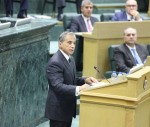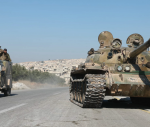You are here
Wise words on eve of summit
Mar 22,2014 - Last updated at Mar 22,2014
His Majesty King Abdullah’s interview with London-based Al Hayat newspaper on Friday, just ahead of the Arab summit in Kuwait, gives a comprehensive overview of the situation in Jordan and the region.
It should be compulsory reading for the country’s citizens and for many Jordanian and foreign politicians.
At domestic level, the King highlighted the important strides taken to navigate the turbulent waters stirred by the Arab Spring.
“We in Jordan have chosen a third way: Political life has not remained stagnant, yet we have not leapt into the unknown. Moreover, we have not reduced reform to only elections. Rather, we have established an integrated and comprehensive system of democratic laws, institutions and practices,” said the King.
The Arab Spring was the catalyst that revived and deepened reform, which started with amending the Constitution, developing core political laws — pertaining to elections, political parties and public assembly — and establishing democratic institutions with strong mandates, such as the Independent Elections Commission and the Constitutional Court, holding parliamentary and municipal elections and introducing a new mechanism for the appointment of governments, based on consultations with MPs, said the Monarch.
The process is meant to empower citizens to participate in the decision-making process, entrench the democratic approach, achieve economic growth and promote social justice.
The Monarch also talked about regional issues that, in view of the intertwined lives and interests of its peoples, cannot but affect Jordan.
The Arab world is facing “critical challenges against a backdrop of ongoing regional and global changes”, so the summit in Kuwait this week should be an opportunity “to bring the positions of Arab countries closer together as we deal with these challenges” and to “focus on Arab integrations, which is the real solution to our political, security and economic challenges”, said King Abdullah.
The Palestinian cause, “central to Arabs and the region” will be tackled by Jordan at the summit, said the King, with focus on “the need to support the peace process, in line with the Arab Peace Initiative and relevant international resolutions, in a way that meets the aspirations of the Palestinian people to establish their independent state on their national soil with East Jerusalem as its capital”, while ensuring “that Jordan’s rights and higher interests related to final status issues are safeguarded”.
The sensitive issue of “alternative homeland” surfaced, in this context. The Monarch said this “illusion” is promoted by Israeli hardliners “bent on the possibility of depopulating Palestinian territories of its people, forcing them into Jordan”.
At the same time, “if the talk about alternative homeland is being used to spread the poisonous idea of a political quota system in Jordan and divide people to incite them on the basis of origins and regions, then the Jordanian people from all backgrounds will reject such a destructive discourse because our national identity is inclusive.”
Another issue of great impact on Jordan is the Syrian conflict, which wreaks havoc on the country and made millions flee, seeking refuge in neighbouring countries.
While Jordan will continue to lend all the support it can to the Syrian refugees, there is need to find a political solution to Syria’s plight, one that ensures the country’s unity and ushers in a “comprehensive transition process that saves Syria and spares it and the region further violence, strife and damage”, said King Abdullah.
Also discussed were Egypt, Iran, superpower tension and terrorism. Yet, the issue that most interests citizens is the country.
The King’s words are most elucidating and summarise what citizens feel: “The constant that will not change is the relationship between the monarchy and the people. Our responsibility is to dedicate ourselves to the service of the people, attend to their interests and to be a safety valve in the areas where that is required, especially when defending our national security and maintaining our core values of unity, pluralism, openness, tolerance and moderation. This is our unchanging covenant before God and the people.”
The Kuwait summiteers would do well to read the interview. Only a common Arab stand can ensure that the Ummah faces modern-day challenges.












